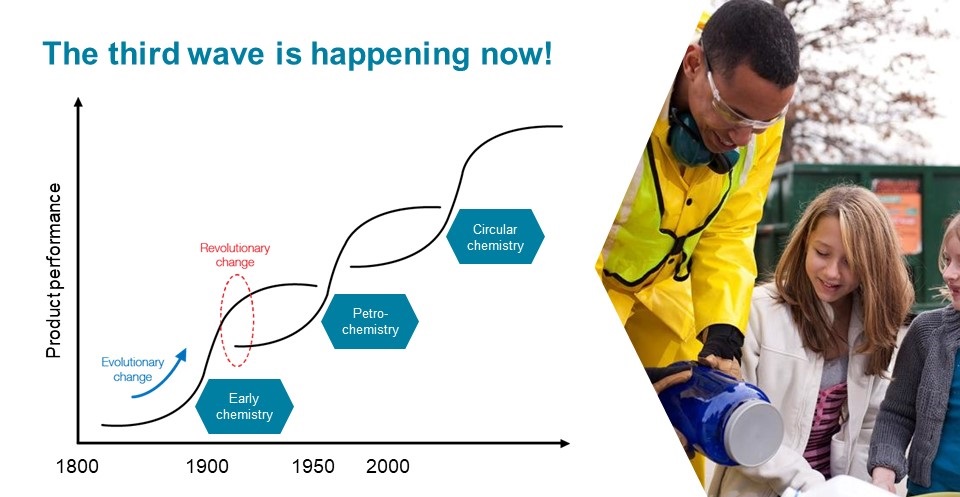CIEX 2020 VIRTUAL conference is just around the corner and as part of our pre-conference interviews we recently spoke with Dr. Christian Hartel, Member of the Executive Board at WACKER about the highlights of his session on Green Deal dilemmas and the main challenges.
Question #1: Without giving too much away – what is the core message of your talk and what would you like delegates to remember?
Christian Hartel: Innovation is the key ingredient of Europe’s recipe for competitiveness, not the least for the chemical industry. So naturally, we tend to put a lot of trust into innovation, solving our challenges and paving the way into the future. However, while new inventions and technologies certainly will continue to propel us forward, innovation alone will not be able to bring the Green Deal forward in the way we have envisioned it.
What we need more than ever, is a complementing framework that enables the European Green Deal to work from the bottom-up and that gives economic actors the right tools to put it into practice. While there are many contributing pieces towards this, the access to affordable renewable electricity belongs to the most important ones. It is unarguably the cornerstone of an economy aiming for climate-neutrality by 2050, and a decisive factor for developing and scaling-up the application of key low-carbon innovations such as direct electrification, green hydrogen or carbon capture utilization (CCU) in the wider economy.
However, as long as most of our international partners don’t share the same ambition for climate action as Europe, especially our energy-intensive industry will continue seeing the structural competitiveness gap increase vis-à-vis global players. An illustrative example is our situation, in which WACKER finds itself since a couple of years: In the case of polysilicon, the basic material for solar panels and semiconductors, WACKER faces electricity costs 2-3 times higher than in comparison to its key competitors in Western China, who benefit from cheap electricity prices and other state-backed subsidies, such as cheap financing and land use rights. As a consequence, Chinese producers have been able to drastically strengthen their dominance along the entire value chain of solar panels, at the expense of Europe’s industrial autonomy and competitiveness.
The second, major challenge of the Green Deal is, therefore, to ensure an industrial transition according to the objectives of the Green Deal that doesn’t compromise global competitiveness. Facing a tough economic outlook in the aftermath of the global COVID19 crisis, this objective is only gaining in significance. At WACKER, we consider a European electricity price to be a complementary building block for bridging the decarbonization and competitiveness gap for European industry in the long-term, as well as part of an effective economic recovery response in the short-term. This is what we would call a “constructive green deal”, helping the environment, growing the industry and securing jobs in Europe.
Question #2: Why did you choose the topic of your talk?
Christian Hartel: WACKER and its employees, being part of a family-owned company since over a century, have always worked hard at putting sustainability at the very heart of our business. In fact, as a significant global and Europe’s only supplier of hyperpure polysilicon, we provide our customers with the basic raw material that is enabling one of the cleanest and most cost-efficient energy sources of the future: photovoltaic energy. Providing fossil-free electricity for an integrated energy system will be one of the major tasks of our upcoming decade and our employees are working with lots of inspiration on developing new solutions, for example, in the field of silicon-based anode materials for the next-generation batteries.
Speaking not only as a supplier, but also as a big consumer of electricity, we believe that electrification of the chemical industry is one of the main levers to steer our sector towards climate neutrality by 2050. Due to technical necessities, WACKER has already electrified several processes in the production of solar polysilicon. Now, we want to leverage that technical know-how to other applicable areas and together with other parts of the value chain, make sure that we deliver on the objectives that we, as a society, have set for ourselves and our future.
But despite welcoming the objectives introduced by the Green Deal, the obligation for becoming climate neutral also introduces a dilemma of a new kind. While investing into innovative processes and new electrified plants will increase the capital and operational costs for European producers, on the one hand, international competitors on the commodity market will on the other hand not face the same constraints, as they operate under completely different industrial systems and climate targets.
If this transformation is to sustain in the long-term, we must recognize that – unlike when the ETS was introduced – the EU’s energy-intensive industry is today in a harsh systemic competition with China and other regions. This structural distortion of competition must be acknowledged and can only be resolved by introducing a smart mix of carbon leakage protection instruments that enable European innovations and carbon-neutral production processes to stay competitive towards global and fossil competitors. At WACKER, we believe that a European industrial electricity price is an indispensable tool in that policy toolbox.
Question #3: What motivates you to join CIEX 2020 and what are your expectations?
Christian Hartel: We at WACKER don’t have all the answers to our challenges and frankly, many of these challenges can only be tackled jointly. For example, understanding how we as the industry can help in securing and supplying affordable renewable electricity – which in the light of the climate neutrality target essentially is becoming a scarce resource – is a topic that needs to be discussed with everyone along the value chain, as it will shape all of our innovation and investment activities.
Of course, I am looking forward to receiving input from other participants and hearing on how they deal with challenges that are similar to ours. Last but not least I am open to bringing back home ideas for new technologies that we might be able to apply at WACKER.
Question #4: The need for innovation has been a continued topic for the chemical industry – how would you sum up the current state of the industry, specifically with a focus on its innovation efforts?
Christian Hartel: Sustainability is without a doubt the overriding topic for the whole chemical industry and can be approached from different angles. From the b2b-consumer perspective, it means tighter specifications and higher traceability for products, and better foresight with regards to regulatory compliance – achieving all of the above at a better cost position and offering better functionality.
From the manufacturing side, increasing sustainability will manifest itself in developing more efficient processes – so basically, making more from less. Feedstock needs to become more renewable and circular, meaning a higher degree of utilizing carbon dioxide, green hydrogen, natural raw materials without causing additional environmental damage. To give an example, nowadays we at WACKER source two of our biggest raw materials, acetic acid and methanol, also from plant-based sources.
Obviously, this can be a challenge when scaling-up production, since regional hubs often need to provide global supply chains. This whole menu amounts to squaring the circle – and here, setting the right priorities at the very start is key. What is important to me is that the developed innovations have the potential to be commercialized. Again, this can only happen with effective support measures by the government to prevent carbon leakage.
Question #5: What must (chemical) industry leaders do to remain competitive and prepare for the future?
Christian Hartel: The chemical industry is often referred to as “the industry of industries”, as it presents the very backbone of all other industrial value chains. Applying a strategy that fails to acknowledge this basic structure and that in the worst-case makes chemical production uneconomical in Europe will be counterproductive not just for the objective of reducing CO2 emissions, but also for re-building a sustainable industrial ecosystem in Europe.
I think that the first thing we must do as industrial leaders is to signal our willingness to lead by exemplary change and action. This will undoubtedly take lots of effort and through various means. In the end, only by rebuilding trust and confidence towards society, can we jointly define our path towards carbon neutrality.
At the same time, I believe that by showing commitment towards sustainability, we are fueling the motivation of our own employees, attracting new talents from around the world and thereby equipping ourselves with the best minds possible to help us become more competitive in a sustainable manner.
Question #6: Looking back on the past 3 months please share your thoughts on the impact of COVID-19 on the industry but also society in general
Christian Hartel: Speaking from a company’s point of view, facing an economic recession caused by such a drop in demand and production is not a pretty thing. It naturally causes some concern and worry about the future. Our colleagues at WACKER have reacted in the most professional manner, with a priority on health, safety, and serving our customers among all the on-going pressures. By doing that, we’ve managed to ensure the viability of the company. Now, we want to make sure that we are positioned in the right way to provide solutions that society demands as the situation continues to evolve.
From a more general perspective, COVID-19 has highlighted the vulnerabilities of our current economic system. In today’s interconnected world, nobody is invincible. With that realization comes a certain degree of humility that can hopefully be transformed into better insight on how to restructure our economy according to the priorities and principles of the Green Deal and the Sustainable Development Goals.
The current situation gives us a unique opportunity to rethink where we are and where we want to go. Indeed, the transition to a climate-neutral economy, to a circular economy and the protection of biodiversity all have the potential to rapidly deliver jobs, growth and improve the way of life of all citizens worldwide, and to contribute to building more resilient societies.
It’s not a matter of creating a new economy from scratch. We already have all the tools and many promising technologies. Over the last 10 years, tremendous progress has been made in most transition sectors, developing new technologies and value chains, and dramatically reducing the cost of the transition: 10 years ago, wind energy was three times more expensive than it is today, and solar energy seven times.
Political will is here. We already have the plans and strategy. Projects such as the European Green Deal and other national zero carbon development plans have a huge potential to build back our economy and contribute to creating a new AND SUSTAINABLE prosperity model.
It’s time to prepare Europe for the future and design recovery plans, both at the local, national and at the EU level, enshrining the fight against climate change as the core of the economic strategy. Massive recovery investments must trigger a new European economic model: An economy that is more resilient, more sustainable, more sovereign and more inclusive. The social impact of the Covid-19 epidemic is already tremendous and resistance to further investments in the transition to a climate-neutral economy is not the way forward.
[adrotate group=”1″]



